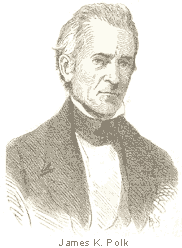The frontrunners for the presidential nominations in both parties, Henry Clay (Whig) and Martin Van Buren (Democrat), feared that the annexation of Texas would split their parties. The two political professionals agreed to cloud the issue in the hope of keeping it off center stage. They expressed a willingness to support annexation if Mexico would agree; there was absolutely no chance that would occur.
President Tyler used this situation to advance his feeble hope for a second term. Lacking support from either party, he attempted to build support by backing the annexation of Texas.
 Clay easily won the 1844 Whig nomination, but Van Buren ran into trouble at the Democratic convention, which was held in Baltimore on May 27-29, 1844. The delegates reinstituted an old rule that required a two-thirds majority for nomination, rendering it impossible for Van Buren's anti-annexation campaign to succeed. For the first time in American history, a true "dark horse" candidate (meaning a candidate who had received little notice before the convention) was able to secure the nomination. James K. Polk of Tennessee appealed to the delegates because he was a protégé of Andrew Jackson (called "Young Hickory"), had initially supported the frontrunner Van Buren, and was an outspoken advocate of annexation. Polk won the 1844 nomination on the ninth ballot.
The campaign was confusing and bitter. Clay was confident of victory, believing that the pro-annexation vote would be split between Polk and Tyler. However, Tyler recognized the hopelessness of his cause and pulled out of the race. Polk and the Democrats espoused the expansionist position, calling for the "reoccupation of Oregon" and the "reannexation of Texas." The cry of "Fifty-four Forty or Fight!" was raised by the Democrats, condemning the British presence in the Northwest. Clay belatedly switched his position on annexation. Newspaper attacks targeted both major candidates, Clay labeled a drunkard and Polk chided as an unknown, repeatedly asking "Who is James K. Polk?"
Polk's margin in the Electoral College was substantial, but the popular vote in the presidential election of November, 1844, was extremely close. His boisterous expansionism played very well in the West and he lost just Ohio and Tennessee. The anti-slavery campaign of James G. Birney of the Liberty Party drew away sufficient votes to deny Clay the presidency.
Clay easily won the 1844 Whig nomination, but Van Buren ran into trouble at the Democratic convention, which was held in Baltimore on May 27-29, 1844. The delegates reinstituted an old rule that required a two-thirds majority for nomination, rendering it impossible for Van Buren's anti-annexation campaign to succeed. For the first time in American history, a true "dark horse" candidate (meaning a candidate who had received little notice before the convention) was able to secure the nomination. James K. Polk of Tennessee appealed to the delegates because he was a protégé of Andrew Jackson (called "Young Hickory"), had initially supported the frontrunner Van Buren, and was an outspoken advocate of annexation. Polk won the 1844 nomination on the ninth ballot.
The campaign was confusing and bitter. Clay was confident of victory, believing that the pro-annexation vote would be split between Polk and Tyler. However, Tyler recognized the hopelessness of his cause and pulled out of the race. Polk and the Democrats espoused the expansionist position, calling for the "reoccupation of Oregon" and the "reannexation of Texas." The cry of "Fifty-four Forty or Fight!" was raised by the Democrats, condemning the British presence in the Northwest. Clay belatedly switched his position on annexation. Newspaper attacks targeted both major candidates, Clay labeled a drunkard and Polk chided as an unknown, repeatedly asking "Who is James K. Polk?"
Polk's margin in the Electoral College was substantial, but the popular vote in the presidential election of November, 1844, was extremely close. His boisterous expansionism played very well in the West and he lost just Ohio and Tennessee. The anti-slavery campaign of James G. Birney of the Liberty Party drew away sufficient votes to deny Clay the presidency.
| Election of Candidates |
Party | Electoral Vote |
Popular Vote |
|---|---|---|---|
| James K. Polk (TN) George Mifflin Dallas (PA) |
Democratic | 170 | 1,339,368 |
| Henry Clay (KY) Theodore Frelinghuysen (NJ) |
Whig | 105 | 1,300,687 |
| James G. Birney (KY) Thomas Morris (OH) |
Liberty | 0 | 62,103 |